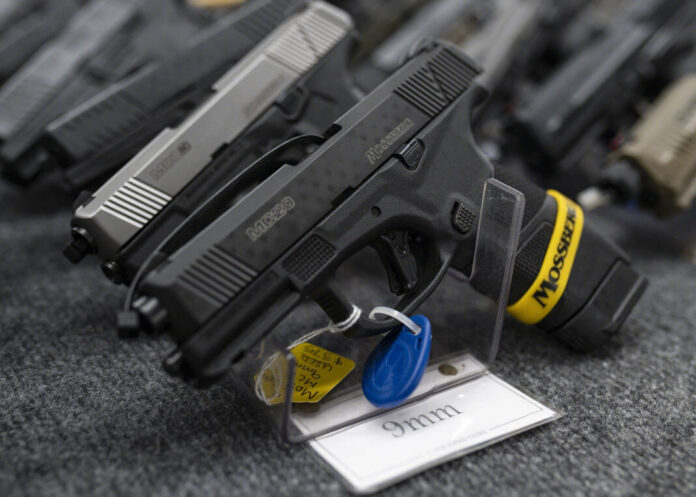
FILE - Pistols sit on display during the first day of the Silver Spur Gun and Blade Show Saturday, Jan. 22, 2022 in Odessa, Texas.
National and state leaders representing Bartholomew County have different views on a bipartisan gun violence bill that cleared the Senate last week following massacres in Buffalo, New York and Uvalde, Texas.
On Thursday, the Senate voted 65-33 to pass the Bipartisan Safer Communities Act, with 15 Republicans — including Sen. Todd Young, R-Indiana — joining all 50 Democrats in favor of the bill. Sen. Mike Braun, R-Indiana, voted against the measure.
The bill was then passed by the House on Friday in a 234-193 vote, with 14 Republicans joining Democrats. Rep. Greg Pence, R-Indiana, was one of three Republicans who didn’t cast a vote. Pence is recuperating from a cardiac procedure at Columbus Regional Hospital last week.
The votes came about one month after a gunman in Uvalde killed two teachers and 19 students — including a 10-year-old boy who had family in Columbus, The Associated Press reported. Just days before that, a white man was accused of being motivated by racism as he killed 10 Black grocery shoppers in Buffalo. Both shooters were 18 years old, a youthful profile shared by many mass shooters, and the close timing of the two shootings and victims with whom many could identify stirred a demand by voters for action, lawmakers of both parties said.
What does the bill do?
The $13 billion measure would toughen background checks for the youngest gun buyers, keep firearms from more domestic violence offenders and help states put in place “red flag” laws that make it easier for authorities to take weapons from people adjudged dangerous, according to wire reports. It would also fund local programs for school safety, mental health and violence prevention.
“Red flag” laws allow police or courts to seize guns from people who show warning signs of violence.
Indiana was one of the first states to enact a red flag law, after an Indianapolis police officer was killed in 2004 by a man whose weapons were returned to him despite his hospitalization months earlier for an emergency mental health evaluation.
The Senate bill also expands the use of background checks by rewriting the definition of the federally licensed gun dealers required to conduct them, acording to wire reports. Penalties for gun trafficking are strengthened, billions of dollars are provided for behavioral health clinics and school mental health programs and there’s money for school safety initiatives, though not for personnel to use a “dangerous weapon.”
Young responds
In a statement following the vote, Young said he voted in favor of the bill because “it takes prudent steps to address our mental health crisis and combat violent crime without compromising the Second Amendment rights of law-abiding Hoosiers.”
Earlier in the week, Young voted to proceed to debate on the bill, but also said he was still going over the 80-page bill before the vote.
“I am a strong supporter of the Second Amendment, and I believe there are prudent steps that Congress can take to address gun violence, particularly related to bolstering mental health resources, without compromising the Second Amendment rights of law-abiding citizens,” Young said.
Young had previously expressed support “red flag” laws, telling The Republic in May that “enforceable red flag laws give local law enforcement a better chance at stopping senseless attacks” and that “the federal government can come alongside these efforts and provide state and local government with more resources to best execute red flag laws.”
Following Thursday’s vote, Young pointed to many organizations that he said supported the measure, including the National Sheriffs’ Association, Fraternal Order of Police, National Association of Police Organizations, Indiana Council of Mental Health Centers, among others.
“As I reviewed this proposal, I consulted with law enforcement officials, gun owners, Second Amendment experts, educators, and mental health professionals,” Young said in the statement. “After careful consideration, I support this targeted legislation because it takes prudent steps to address our mental health crisis and combat violent crime without compromising the Second Amendment rights of law-abiding Hoosiers.”
“If you are a law-abiding citizen and have not been adjudicated as mentally ill, your Second Amendment rights will not be affected in any way,” Young added. “This bill contains no new restrictions, bans, required waiting periods or mandates for law-abiding citizens of any age.”
Braun response
On Friday, Braun said in a statement that he voted against the bill because he received “overwhelming feedback” from Hoosiers that he should not support it.
“Since the bill text was released earlier this week, I’ve been focused on listening to what Hoosiers think about it, and the overwhelming feedback I’ve received has been for me to oppose the bill, and that’s why I voted no,” Braun said.
Earlier this month, Braun visited Columbus for a roundtable with community leaders at Zaharakos and told The Republic that it’s important to be pragmatic and seek a solution to gun violence and mass shootings that actually has a likelihood of being passed in Congress, and that it may be best to let states make their own decisions about how to respond.
“Every time it occurs, it’s horrific, of course,” Braun said. “The issue is embedded in a constitutional right and culture. And it’s so complicated, it’s so intertwined. But I always, as a practical individual, look at what’s the thing that you can do that’s the lowest-hanging fruit that can get 10 votes in the Senate, if there’s going to be a federal solution to it.”
He also noted that support for certain measures, such as expanding background checks, likely varies by state. He added that lowering the legal age to buy assault weapons has also been discussed and pointed to Indiana’s “red flag” law” as something that has benefited the state.
“It’s a question, though, of what you can get done, and does it require a solution across the board?” said Braun. “I’m a big proponent that you find out maybe what the best combination is by not trying to do it from the top-down, let states maybe wrestle with what makes sense for them, see what works.”
The response from Pence
It is unclear what Pence’s view is on the bipartisan legislation. Pence did not cast a vote on Friday and did not respond to a request for comment.
Earlier this month, Pence voted against a “red flag” bill in the House that would allow families, police and others to ask federal courts to order the removal of firearms from people at extreme risk of harming themselves or others.
Pence also recently voted against the Protecting Our Kids Act, which would have raised the age limit for purchasing a semi-automatic rifle and prohibit the sale of ammunition magazines with a capacity of more than 10 rounds.
The Republic specifically about his position on the content of the Protecting Our Kids Act and why he voted as he did.
“I have zero confidence that Nancy Pelosi and the far-left Democrats in Washington know how to protect Hoosier children from the next school violence situation,” Pence said, through his spokeswoman Hannah Osantowske. “(House Speaker) Nancy Pelosi wants to mandate the failed policies of San Francisco in every home across Indiana and that is something I will never support. Left-wing Democrats in Washington have again showed they have no appetite at all to seek common ground and their allies in the media will once again fail to call them out for their partisan extremism.”
Rep. Greg Pence
Mike Wolanin | The Republic Senator Mike Braun visits Zaharakos for a roundtable discussion with community leaders in Columbus, Ind., Friday, June 3, 2022.
Sen. Todd Young







